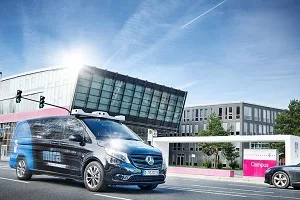Deutsche Telekom AG and MIRA GmbH have jointly launched a pilot project for teleoperated driving. The project partners are testing the shuttle service with teleoperated operation between various Telekom locations in Bonn.
Teleoperation can optimally support automated shuttle fleets. For example, the technology avoids long idle and waiting times. Controlling vehicles remotely from a control centre also increases vehicle utilisation.
“We are convinced that teleoperated driving will play an important role in improving the efficiency and sustainability of transport,” says Klaus Kappen, CEO of MIRA GmbH. “By working with Deutsche Telekom AG, we can develop innovative solutions for the mobility of the future and test them on public roads today.”
5G as the basis for teleoperated driving
Teleoperated driving requires a low-latency, high-performance 5G network. Telekom’s network ensures the transmission of large volumes of data in real time from the vehicle to the remote-control station. This allows vehicles to be reliably controlled remotely.
“Mobility is changing. In the future, teleoperation will take people from A to B in a new way. Safely and conveniently! We want to make this possible for our colleagues, too. And that’s why we are testing a teleoperated vehicle on the test track at Telekom Deutschland headquarters,” says Olga Nevska, managing director of Telekom Mobility Solutions.
“Bicycle, bus, light rail and streetcar – Bonn already stands for modern and climate-friendly mobility services. We are pleased to be one of the first cities in Germany to enable tests for an innovative shuttle service: remote-controlled vehicles. Passengers will save time. Shuttle operations will become more efficient. Teleoperation can become a building block of our Bonn mobility turnaround in the future. With strong public transport and safe, attractive services for everyone,” says Bonn’s mayor Katja Dörner.
New 5G technologies for future mobility concepts
In the future, 5G technologies such as network slicing or quality on demand will make applications possible that rely on extremely low latency and high bandwidths at the same time. The pilot project provides Telekom with in-depth insights into the requirements for these new technologies and for the 5G network infrastructure, which are important for the development of driverless mobility.
MIRA GmbH has set itself the goal of playing a key role in shaping the path to automated driving and thus the future of mobility. With teleoperation, MIRA makes it possible to meet challenges in local transport and logistics with new and individualisable mobility models.
In Germany, remote-controlled journeys are currently still regulated. As a rule, they are only permitted on private property or defined test routes. Teleoperation can become an important building block in the mobility of the future. The legal framework for teleoperation is currently being defined at national and European level.
Comment on this article below or via Twitter: @VanillaPlus OR @jcvplus






